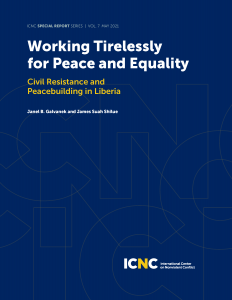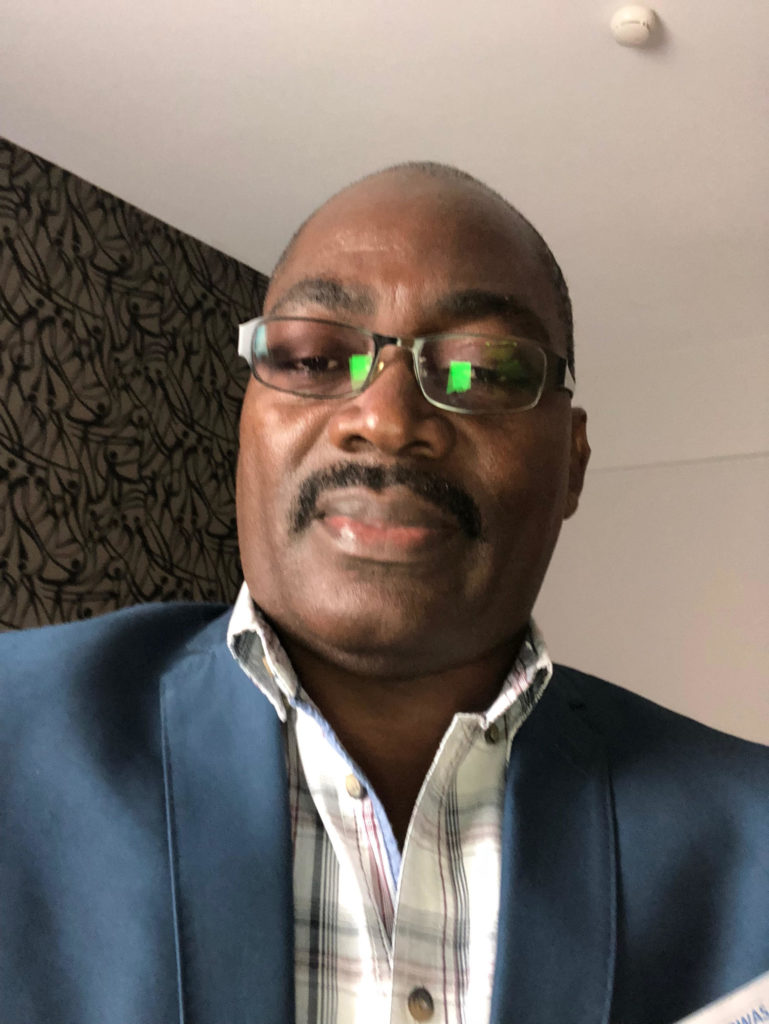Working Tirelessly for Peace and Equality: Civil Resistance and Peacebuilding in Liberia
By Janel B. Galvanek and James Suah Shilue
Date of Publication: May 2021
Free Download
Purchase a Print Copy
Purchase e-book (Nook | Kindle)
 From the establishment of the Liberian state in 1848, the Americo-Liberian settlers—descendants of freed slaves from the USA—imposed a form of indirect rule over the indigenous Liberian population that oppressed, marginalized and exploited the majority of the population. This treatment of the native population became increasingly unsustainable, and in 1980 the settler government was overthrown. A 10-year dictatorship was followed by a violent civil war that lasted until 2003. Using the framework developed by Veronique Dudouet in her 2017 ICNC Special Report, Powering to Peace: Integrating Civil Resistance and Peacebuilding Strategies, this case study examines the methodologies and approaches of the various actors involved in civil resistance and peacebuilding throughout the various phases of conflict in Liberia, from a period of latent conflict to the post-settlement phase after 2003. Many different actors in Liberia pursued strategies of peacebuilding and civil resistance simultaneously, which led to the complementarity of their work and increased the impact they had on both political and civic reform, as well as on the ultimate peace process. The case study takes an in-depth look at the impact that the strategies had on each other in their common pursuit of peace and justice in Liberia.
From the establishment of the Liberian state in 1848, the Americo-Liberian settlers—descendants of freed slaves from the USA—imposed a form of indirect rule over the indigenous Liberian population that oppressed, marginalized and exploited the majority of the population. This treatment of the native population became increasingly unsustainable, and in 1980 the settler government was overthrown. A 10-year dictatorship was followed by a violent civil war that lasted until 2003. Using the framework developed by Veronique Dudouet in her 2017 ICNC Special Report, Powering to Peace: Integrating Civil Resistance and Peacebuilding Strategies, this case study examines the methodologies and approaches of the various actors involved in civil resistance and peacebuilding throughout the various phases of conflict in Liberia, from a period of latent conflict to the post-settlement phase after 2003. Many different actors in Liberia pursued strategies of peacebuilding and civil resistance simultaneously, which led to the complementarity of their work and increased the impact they had on both political and civic reform, as well as on the ultimate peace process. The case study takes an in-depth look at the impact that the strategies had on each other in their common pursuit of peace and justice in Liberia.
About the Authors:
 Janel B. Galvanek is a Senior Project Manager at the Berghof Foundation and Director of Growing Tree Liberia, both based in Berlin, Germany. At the Berghof Foundation for 10 years, she is currently managing the Foundation’s projects in Somalia, which support mediation and reconciliation initiatives with local communities in the country. Janel’s professional focus includes engaging local actors and communities in peacebuilding and conflict transformation processes, as well as the interaction and coexistence between state-based conflict resolution mechanisms on one hand and community-based, traditional conflict resolution mechanisms on the other. She has done extensive research in Liberia on this topic as well as on the reintegration of former child combatants. In the past, Janel has also managed dialogue projects involving the High Peace Council and Ulema Council of Afghanistan. Janel’s work with Growing Tree Liberia supports the construction of a home designated for street children in Liberia and awards school scholarships for disadvantaged children in the downtown Monrovia area. She holds a Master’s degree in Peace Research and Security Policy from Hamburg University and an MA from Georgetown University in Washington, DC.
Janel B. Galvanek is a Senior Project Manager at the Berghof Foundation and Director of Growing Tree Liberia, both based in Berlin, Germany. At the Berghof Foundation for 10 years, she is currently managing the Foundation’s projects in Somalia, which support mediation and reconciliation initiatives with local communities in the country. Janel’s professional focus includes engaging local actors and communities in peacebuilding and conflict transformation processes, as well as the interaction and coexistence between state-based conflict resolution mechanisms on one hand and community-based, traditional conflict resolution mechanisms on the other. She has done extensive research in Liberia on this topic as well as on the reintegration of former child combatants. In the past, Janel has also managed dialogue projects involving the High Peace Council and Ulema Council of Afghanistan. Janel’s work with Growing Tree Liberia supports the construction of a home designated for street children in Liberia and awards school scholarships for disadvantaged children in the downtown Monrovia area. She holds a Master’s degree in Peace Research and Security Policy from Hamburg University and an MA from Georgetown University in Washington, DC.
 James Suah Shilue is the Executive Director of Platform for Dialogue and Peace (P4DP), a Liberian peacebuilding NGO involved in research and participatory action activities aimed at strengthening the capacities of state and non-state actors to prevent, manage and transform conflict through collaborative action. James also lectures at the Department of Sociology and Anthropology at the University of Liberia. He has been serving as Executive Director for P4DP since June 2012. Prior to occupying this position, James served as Liberia Programme Coordinator for Interpeace and was responsible for the day-to-day management and overall direction of the programme. Mr. Shilue has been working on issues of development, research, Ebola, resilience, peacebuilding and conflict prevention, including land disputes and their resolution, for more than 15 years. In addition to overseeing the overall programme of Interpeace in Liberia, he has collaborated and provided consultancy services for various international projects, including the Geneva Graduate School Small Arms Survey, a Bentley University research project, the European Union Fragility and Resilience project, the USIP and George Washington University Rule of Law projects, the World Bank, the George Washington IDRC Liberian Diaspora Research project, the Carter Centre Urban Justice project and the International Center for Migration Policy Development. James has a Master’s Degree in Social and Community Studies (De Montfort University, UK) and an MA in Development Studies (Institute of Social Studies, The Hague). Mr. Shilue has extensive experience in the management of complex operations and uses this experience to hone his skills in facilitation, partnership development and peace research, including issues on human security, peace and reconciliation, and natural resource management.
James Suah Shilue is the Executive Director of Platform for Dialogue and Peace (P4DP), a Liberian peacebuilding NGO involved in research and participatory action activities aimed at strengthening the capacities of state and non-state actors to prevent, manage and transform conflict through collaborative action. James also lectures at the Department of Sociology and Anthropology at the University of Liberia. He has been serving as Executive Director for P4DP since June 2012. Prior to occupying this position, James served as Liberia Programme Coordinator for Interpeace and was responsible for the day-to-day management and overall direction of the programme. Mr. Shilue has been working on issues of development, research, Ebola, resilience, peacebuilding and conflict prevention, including land disputes and their resolution, for more than 15 years. In addition to overseeing the overall programme of Interpeace in Liberia, he has collaborated and provided consultancy services for various international projects, including the Geneva Graduate School Small Arms Survey, a Bentley University research project, the European Union Fragility and Resilience project, the USIP and George Washington University Rule of Law projects, the World Bank, the George Washington IDRC Liberian Diaspora Research project, the Carter Centre Urban Justice project and the International Center for Migration Policy Development. James has a Master’s Degree in Social and Community Studies (De Montfort University, UK) and an MA in Development Studies (Institute of Social Studies, The Hague). Mr. Shilue has extensive experience in the management of complex operations and uses this experience to hone his skills in facilitation, partnership development and peace research, including issues on human security, peace and reconciliation, and natural resource management.